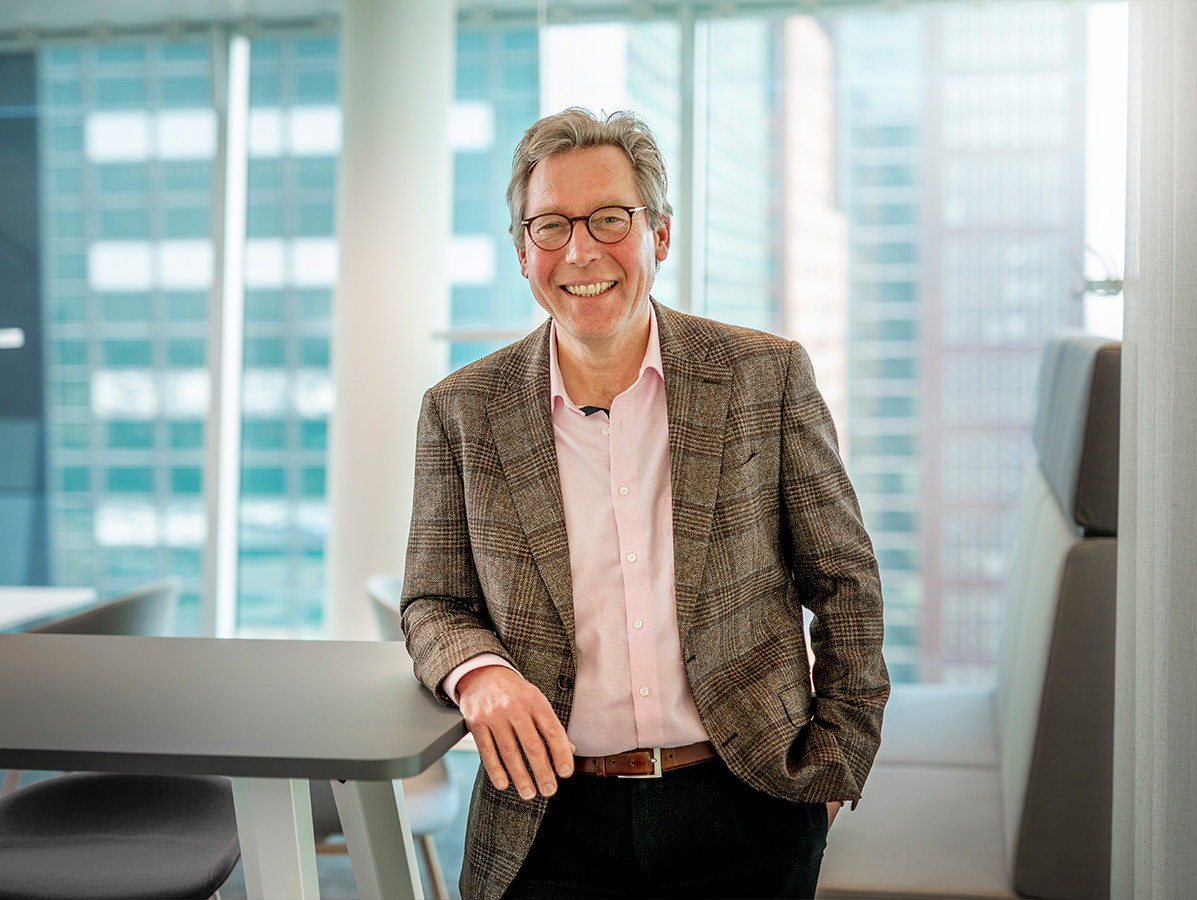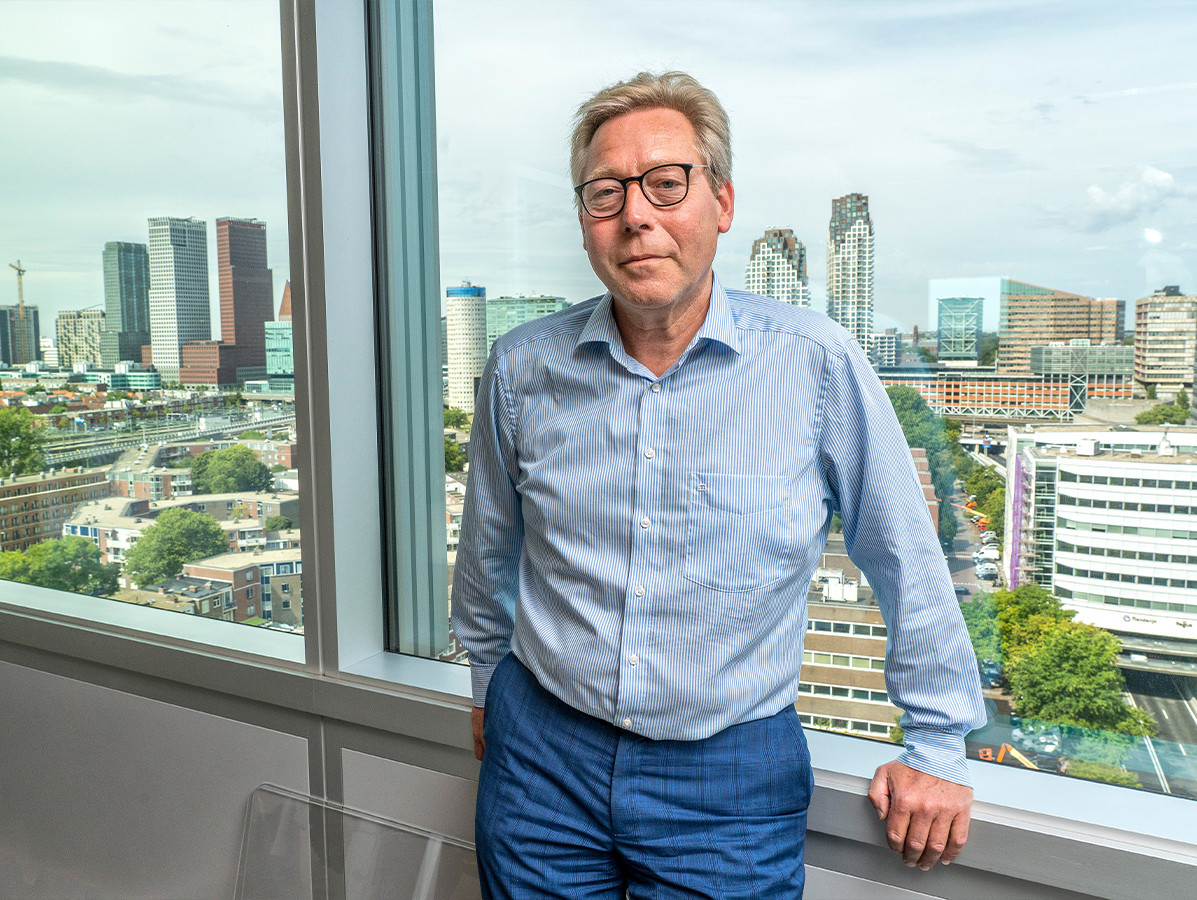
"The intrinsic motivation of the food industry to start working on sustainability is high," believes Cees-Jan Adema, director of the Federation of Dutch Food Industry (FNLI). "Also when it comes to energy saving and electrification. The need has never been higher than now." The challenges are great. A good reason to put your shoulders to the wheel, as this director prefers to think in solutions rather than bottlenecks.
Cees-Jan: "The Netherlands is known for its efficient food production. The challenge ahead of us now is to keep doing that, but at a significantly lower footprint. If we look at the climate targets and the ambitions therein, 'it has to be less' certainly does apply to our fossil energy use. I just think the primary premise for all sustainability challenges should be: 'it has to be different' and sometimes that does indeed mean less."
"Producers throughout the chain, in the Netherlands and internationally, are increasingly being challenged on so-called 'Scope 3 emissions'. More and more companies and processors are making long-term agreements with their suppliers, in which they also include sustainability and environmental aspects. It has long since ceased to be just about your own plant's CO2 emissions. Indirect CO2 emissions and the Life Cycle Analysis (LCA) of products also play a role. A nightmare scenario in this would be if producers have to work out different LCA and other sustainability calculations separately per retailer or per country. European standardisation and harmonisation are incredibly important. Those are not available yet. In this respect, I would like to make an appeal to the ministry: help us out! Fight for unambiguous European standards and norms."
"Firstly, like the rest of the Netherlands, they have to deal with high gas and energy prices. Companies cannot now fully pass on those cost increases to the chain. As a result, they also often have less room to invest and become more sustainable. It is very harsh to say this at a time when more and more people are struggling to pay for their daily food, but internationally, in the Netherlands we spend only a very small part of our income on food. Cost pressures are now putting us in a different playing field. I am a strong supporter of true pricing. Environmental or sustainability costs must be given a place within the whole cost pricing process; then it will pay off to invest in sustainability. It is a strange flaw in the system that if a product is demonstrably more sustainable, we have to explain to the consumer why you have to pay a bit more for it. That does not alter the fact that certainly at a time when there is so much pressure on prices and purchasing power, there is an important obligation to keep good food accessible for the lowest incomes. This calls for targeted income policy for those groups at risk of being trapped. As far as I'm concerned, price policy and income policy should really be separated."
"Another challenge for companies is the energy transition. We need to move from fossil to renewable energy, and to electrification. But the electricity grid is reaching its limits. In some regions of the Netherlands, it is not possible to get additional power connections. That is drastic if you want to expand or want or need to get rid of gas. We want to start the discussion between the business community, the grid operators and the provinces on how to deal with this. In North Brabant and Limburg, for example, we are jointly mapping out where the bottlenecks are and looking for solutions. Are we going to accelerate investment in infrastructure? That will take years. Or should we think about smart technologies to deal with energy demand in a different way? Sometimes there is a surplus of energy due to solar heat and wind, while at other moments there is a shortage. Can we do something with storage? These are questions that are increasingly reaching the provincial level."
"I am not decided on that. We first want to find out what the possibilities and consequences of this are. The important thing is that we prevent the distinctiveness of sustainably grown raw materials from disappearing as a result of such an obligation. I believe that, in the long run, we must move towards more transparency; that as a producer, and ultimately also as an end consumer, you know exactly what the footprint is of the raw materials that have been used. Blending is completely at odds with that development."

"Let's start with the observation that it is absolutely clear that we are hitting boundaries; that is the reason why we need to look for a renewed balance between production and our country's ecological base. This is not just about farmers. That is why we said: 'You can only offer perspective if you involve the entire chain in the ambitions'. More strongly: it is about the entire agrofood system, including the knowledge institutes. We have to think bigger in the Netherlands. Chains are international. Europe is becoming increasingly important. Most of the raw materials processed in the Netherlands come from abroad, and most of what is produced in the Netherlands in terms of agricultural raw materials goes abroad. It would help if we agree that our 'home market' is in a radius of about 800 km around the Netherlands. That is not so strange; in countries like the United States, China, but also France and Germany, everything at that distance still falls under 'domestic production'. This is then immediately a call to politicians: 'Let's act much more collectively, at least within Northwest Europe to put the big issues on the common agenda.'"
"Food packaging is simply necessary; for shelf life, barrier properties, ensuring food safety, preventing food waste and so on. We really don't pack for the faint of heart, which some people might sometimes suggest. It is a big challenge to close the cycles and avoid the use of new fossil resources. It is not only about the packaging you choose as a producer, but also with how consumers dispose of it, how the waste is sorted and what recycling options are available. We have therefore listed a number of behavioural principles. We hope this will make it easier for food packers to talk to their packaging material suppliers and make choices for more sustainable packaging."
"I think so. There are definitely opportunities in more sustainable packaging. Consumers increasingly value circularity. If you can explain why you make certain more sustainable choices for your packaging, why, for example, there is no longer a plastic window in the paper box, that is precisely what consumers appreciate. In addition, producers all pay a contribution to the Waste Fund for the packaging they put on the market. I applaud the idea of differentiating the rates more according to the extent to which a packaging is more or less circular. That too could be an additional incentive for companies to take another look at their packaging."
"Yes indeed. Digitalisation in the chain is about the reliability of the data, and about unambiguous standards for the way the information is switched through the chain. We think it is very important to have European transparent standards and norms for this, and are making a strong case for it."
Resolute: "The companies themselves. At the same time, you need government, science, and, of course, consumers. But it starts with the companies."
"Food safety. A very important focus is the new risk policy. We know more as time goes by, can make more sophisticated lab analyses and measure for contaminations down to very low levels. But 'zero risk' means we will soon be able to process food only in a cleanroom-like environment. Small-scale food production will then eventually no longer be possible. From international supply chains, there is now the question: 'Can we still supply the European market? This leads to tensions. We are not making any concessions on food safety, let that be clear! But it has to remain manageable."
"There are great opportunities for the Netherlands to maintain our leading role in the agri-food sector, also internationally. I think we should do so not only from an economic point of view, it is also an ethical issue. Climate change is reducing the number of areas where we can produce food properly. We are in a very fertile delta here and together we have an enormous amount of knowledge. I don't think we can morally afford to say, 'We're going to heighten the dykes, produce for ourselves and everyone else is on their own'. We have to count our blessings, take responsibility, see the opportunities. And above all, address the latter."
Source: Vakblad Voedingsindustrie 2023